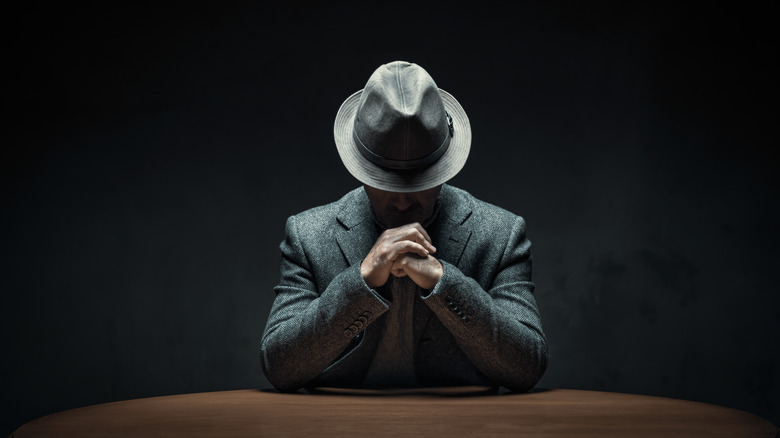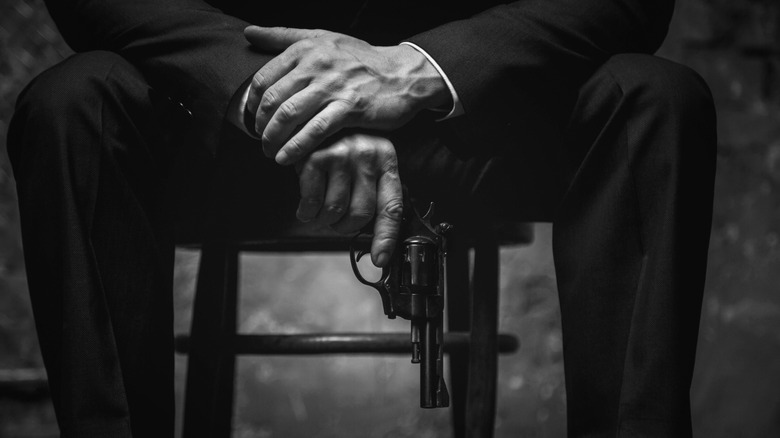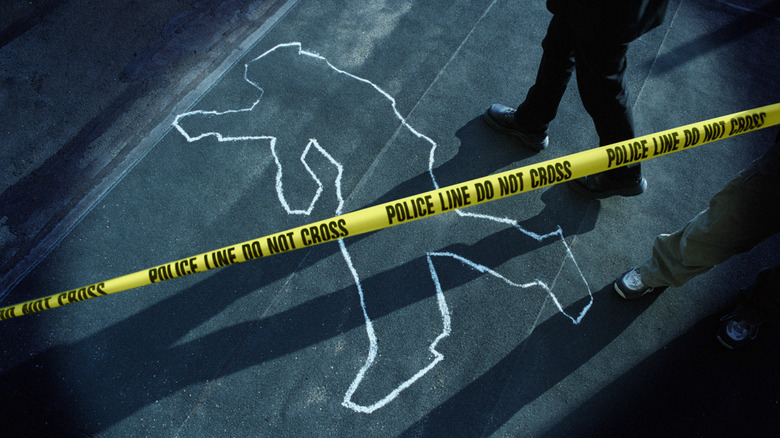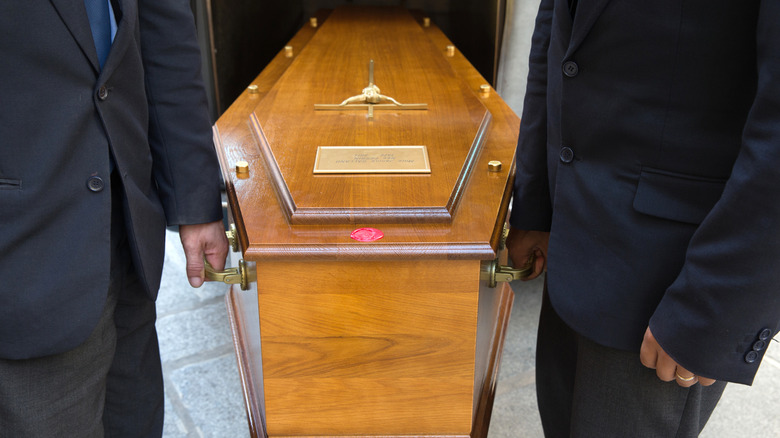What Happens When You Leave The Mafia?
We may receive a commission on purchases made from links.
We all know how the mafia works by now, right? Omerta (aka a vow of silence), vendettas, baseball caps to the knees, unspoken menace between people in suits sitting around tables, a lot of talk of "the family," and plenty of other things that we can attribute to "The Godfather" movies and "The Sopranos." All such fictional accounts — which the public finds endlessly interesting — have roots in real-life gangsters like Al Capone. And while it's hard to separate fact from fiction when it comes to the mafia, one thing's for sure: You can join when you like, but you sure as heck can't ever leave.
At least, that's the assumption. Mafia members aren't exactly forthcoming about the secrets of their lethal criminal organization. And those who leave aren't exactly queuing up to spill their stories and get garrotted in their sleep or something. Information on how to leave the mafia and what happens afterward is scant, and it all comes down to personal testimony. Even then, there's a difference between Cosa Nostra, the infamous Sicilian mafia that's granted us much of our pop cultural mob imagery, and other organized crime outfits around the world. Every country has such organizations, though certain groups like the Japanese yakuza (where leaving is difficult, to say the least) stand out.
In an interview with LADBible, for instance, reformed mob boss Michael Franzese says that he was the only one to successfully leave out of six who swore omerta together. The other guys got killed. He was lucky, and he's been free to do what he likes within the boundaries of the law, past associations, and his own conscience. Same goes for others.
The mafia vs. the mob
Before going any further, we've got to define some terms. Folks tend to use the word "mafia" to mean any kind of structured criminal organization, in general. There are cells in different locations, activities like drug rings and racketeering, goons who do the grunt work, bosses who command things, etc. But really, that's a "mob," with the people in it being "mobsters." This term covers any kind of organized criminal enterprise across the world. And to be sure: Every country has such groups, even the safest ones. As the Global Organized Crime Index shows under the heading "mafia-style," many of the most dangerous groups are in Latin and South America.
Italy, however, ranks high on that list at No. 5. And it's there that we get the origins of the true "mafia." As a term, "mafia" appeared in Sicily in 1862 as "mafiosi," meaning "boldness," "ambition," or "arrogance," as the University of Michigan explains. Also referred to as "Cosa Nostra" ("Our Thing," or "Our Affair"), this is the familial, oath-making, ritualistic kind of mafia that emigrated to the United States along with Italian immigrants and has branches in New York, Chicago, Philadelphia, Detroit, and so forth. While certain rules encompass the entire mafia, circumstances and specifics are different in each branch, under each boss, and for each individual — including what happens when you leave. It's impossible to account for each division in this article, either in Italy or the United States, but some generalities apply everywhere.
Leaving the mafia is difficult and almost certainly deadly
We have to look at personal testimonies to learn about how one leaves the mob and what happens afterward. These are rare and hard to come by, even rarer than someone surviving leaving the mafia to begin with. Michael Franzese, former mob boss of the New York branch of Cosa Nostra, has provided a lot of information on this topic over the years. He left the mafia in 1995 and carries on a successful life preaching and interviewing on numerous shows and podcasts. "There's no blueprint for leaving the mob the way I did and publicly survived the way I have," he told ABC News. The former mafioso repeated himself on "This Morning," adding, "I didn't know how it was going to turn out because I never sell my former associates short." The latter statement refers to the hit put on his head after he left, which he somehow survived. "Everybody thinks you're going to become a witness," he told the "Happy Hour Podcast" in 2024. In that interview, he pointed to Fortune magazine's 1986 list of the 50 wealthiest global mafia members, where he ranked No. 18. Of all the "made men" who charted, all are dead but two, and he's the only one of the two alive that's not in prison around 30 years later.
But in no instance does Franzes describe precisely how he left, how he survived the contract on his life, and how he transitioned to his post-mafia living. He attributes his current life to God and his wife, and that's it. The only thing for certain is this: Leaving the mafia is hard and almost certainly lethal.
Starting a post-mafia life with outside help
There are some instances of people besides Michael Franzese leaving the mafia, living to tell the tale, and building a life however possible. But each of these cases illustrates the rarity of Franzese's case, because they necessitated intervention by some external, protective organization or person, including governments. Take the case of John Pennisi, who left the New York mafia in 2018 and talked to Insider about some of its key rules. Details aren't super forthcoming — this is the mafia we're talking about — but Pennisi left after becoming a government witness in 2017 and working with the FBI, as The Mob Museum recounts. We don't have details on his life, but he's at least living under the protection of the U.S. government no matter the wrath of his former colleagues.
Elsewhere, the Italian government is stepping in early to prevent children from getting involved in the mafia via family ties. Italian law in Calabria at Italy's southern tip allows for children to separate from parents in the case of "inducing a child to commit criminal acts," per the BBC. This is one drastic way for young people to leave the mafia before they get too deep.
But if someone does get too deep — especially women — then people like Luigi Ciotti in Turin, Italy try to help them escape. He helps ex-mafia members get new names and identities, hide evidence of their past (even tattoos), and more. Beyond that, we know little about the details of those people's post-mafia lives.
If not death, retirement
If it isn't clear by now, it's not exactly easy to leave the mafia, and life afterward is almost invariably fraught with fear of violence and death. But there's one more life-after-mafia option rarely afforded certain members: retirement. It seems like a couple people have done it and lived to tell the tale, even if they didn't retire to a sunny beach somewhere.
As All That's Interesting tells the tale, New York mafia boss Joe Bonanno retired following a series of unlikely, strange circumstances and choices. He failed to show up at court to testify regarding organized crime, went into hiding in 1964, then showed up again in 1966 before an inter-family mafia war erupted. Then, in the middle of things, he threw up his hands and left. His high rank, plus perhaps the circumstances leading up to his exit, meant that he was allowed to leave peacefully. We don't know exactly what kind of life he left afterward, but he wrote an autobiography about his time in the mafia called "A Man of Honor" and even did an interview on ""60 Minutes" in 2002.
John Gotti, Jr. also left the mafia in 2010. He sought his father's blessing to leave, cooperated with authorities and got a plea deal for racketeering charges, served time in prison, and then apparently retired to a "two-acre compound" with a "swimming pool and stables," per CBS News. But both he and Bonanno, like Michael Franzese, are the vastly more rare exception to the rule: You don't leave the mafia. Ever.




